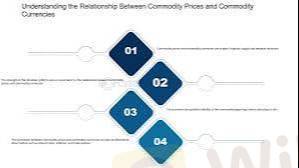
2025-02-12 06:55
IndustryThe role of commodity prices in forex trade
#firstdealofthenewyearastylz
Impact on Currency Value
1. Export-driven economies: Countries that heavily rely on commodity exports, such as Australia (gold, iron ore), Canada (oil, timber), and New Zealand (dairy, lumber), see their currency values influenced by commodity price fluctuations.
2. Commodity price shocks: Sudden changes in commodity prices can impact currency values. For example, a surge in oil prices can strengthen the Canadian dollar (CAD) and weaken currencies of oil-importing countries.
3. Terms of trade: Commodity price changes affect a country's terms of trade, which is the ratio of export prices to import prices. Improving terms of trade can boost a currency's value.
Key Commodities Influencing Forex
1. Oil: As the most widely traded commodity, oil prices significantly impact currencies like the CAD, Norwegian krone (NOK), and Russian ruble (RUB).
2. Gold: Gold prices influence currencies like the Australian dollar (AUD), South African rand (ZAR), and Swiss franc (CHF).
3. Agricultural commodities: Prices of wheat, corn, soybeans, and other agricultural products affect currencies like the Brazilian real (BRL), Argentine peso (ARS), and Canadian dollar (CAD).
Trading Strategies
1. Commodity currency pairs: Trade currency pairs closely tied to commodity prices, such as AUD/USD (gold), CAD/USD (oil), or NZD/USD (dairy).
2. Commodity price speculation: Speculate on commodity price movements to anticipate potential currency fluctuations.
3. Hedging: Use forex trades to hedge against potential losses or gains from commodity price fluctuations.
Risks and Considerations
1. Volatility: Commodity prices can be highly volatile, leading to significant currency fluctuations.
2. Correlations: Commodity prices can be correlated with other markets, such as stocks or bonds, which can impact forex trades.
3. Economic indicators: Keep an eye on economic indicators, such as inflation rates, interest rates, and GDP growth, which can influence commodity prices and currency values.
Like 0

Ronaa
Brokers
Hot content
Industry
Event-A comment a day,Keep rewards worthy up to$27
Industry
Nigeria Event Giveaway-Win₦5000 Mobilephone Credit
Industry
Nigeria Event Giveaway-Win ₦2500 MobilePhoneCredit
Industry
South Africa Event-Come&Win 240ZAR Phone Credit
Industry
Nigeria Event-Discuss Forex&Win2500NGN PhoneCredit
Industry
[Nigeria Event]Discuss&win 2500 Naira Phone Credit
Forum category

Platform

Exhibition

Agent

Recruitment

EA

Industry

Market

Index
The role of commodity prices in forex trade
 Hong Kong | 2025-02-12 06:55
Hong Kong | 2025-02-12 06:55#firstdealofthenewyearastylz
Impact on Currency Value
1. Export-driven economies: Countries that heavily rely on commodity exports, such as Australia (gold, iron ore), Canada (oil, timber), and New Zealand (dairy, lumber), see their currency values influenced by commodity price fluctuations.
2. Commodity price shocks: Sudden changes in commodity prices can impact currency values. For example, a surge in oil prices can strengthen the Canadian dollar (CAD) and weaken currencies of oil-importing countries.
3. Terms of trade: Commodity price changes affect a country's terms of trade, which is the ratio of export prices to import prices. Improving terms of trade can boost a currency's value.
Key Commodities Influencing Forex
1. Oil: As the most widely traded commodity, oil prices significantly impact currencies like the CAD, Norwegian krone (NOK), and Russian ruble (RUB).
2. Gold: Gold prices influence currencies like the Australian dollar (AUD), South African rand (ZAR), and Swiss franc (CHF).
3. Agricultural commodities: Prices of wheat, corn, soybeans, and other agricultural products affect currencies like the Brazilian real (BRL), Argentine peso (ARS), and Canadian dollar (CAD).
Trading Strategies
1. Commodity currency pairs: Trade currency pairs closely tied to commodity prices, such as AUD/USD (gold), CAD/USD (oil), or NZD/USD (dairy).
2. Commodity price speculation: Speculate on commodity price movements to anticipate potential currency fluctuations.
3. Hedging: Use forex trades to hedge against potential losses or gains from commodity price fluctuations.
Risks and Considerations
1. Volatility: Commodity prices can be highly volatile, leading to significant currency fluctuations.
2. Correlations: Commodity prices can be correlated with other markets, such as stocks or bonds, which can impact forex trades.
3. Economic indicators: Keep an eye on economic indicators, such as inflation rates, interest rates, and GDP growth, which can influence commodity prices and currency values.
Like 0
I want to comment, too
Submit
0Comments

There is no comment yet. Make the first one.

Submit
There is no comment yet. Make the first one.